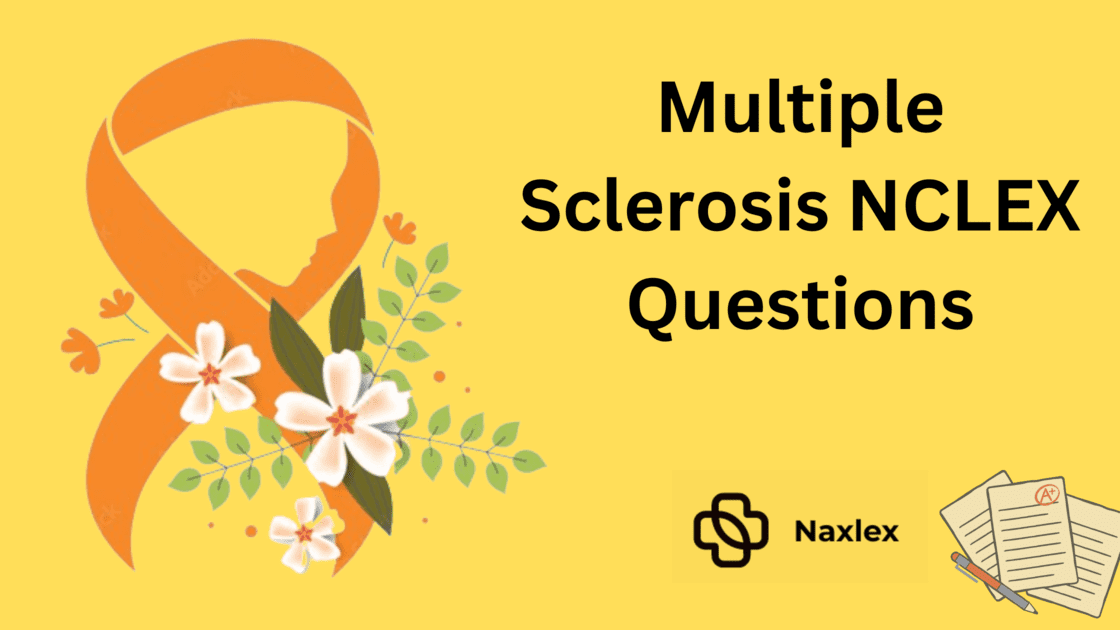Free NCLEX 14-day Free Trial
Try some exam questions on the NCLEX!
Multiple sclerosis NCLEX Questions
Understanding multiple sclerosis, a neurological disorder impacting the central nervous system, is crucial for nursing students preparing for the NCLEX & using Multiple Sclerosis NCLEX Questions. Nurses must grasp the condition's pathophysiology, the medications utilized in treatment, symptoms, and appropriate nursing interventions.
At Naxlex NCLEX, we understand how much every question matters in the NCLEX exam. That's why our tutors have developed Multiple sclerosis NCLEX questions to help you prepare adequately for the exam. We do our best to provide accurate and in-depth Multiple Sclerosis NCLEX questions for your exam preparations. You can also refer to Naxlex NCLEX study guides, flashcards, and video tutorials on NCLEX sclerosis. We strive to offer 100% accuracy despite nursing procedures constantly changing. Prepare with confidence and excel in your NCLEX journey with Naxlex NCLEX. Get started today and take advantage of our several packages and pass your multiple sclerosis NCLEX questions

Multiple sclerosis is a condition characterized by inflammation, where the body's immune system targets and harms nerve tissue in the central nervous system, consisting of the brain and spinal cord. The immune system can occasionally malfunction, leading immune cells to attack organs or tissues within the body. These cells act akin to double agents, disrupting communication between the brain (considered the headquarters) and the organs, muscles, and tissues (referred to as operations) by damaging essential nerve components crucial for efficient information transmission.
Find out: NCLEX RN Shock Questions - Naxlex
What happens when You have Multiple Sclerosis?
The blood-brain barrier typically keeps the fluid surrounding the brain and spinal column from the bloodstream. This specialized membrane selectively permits only certain substances to pass through, preventing immune cells and other unwanted materials from entering the central nervous system. However, individuals with multiple sclerosis frequently experience a breakdown in this barrier, leading to leakage that allows immune cells to penetrate and attack the nerve tissue. This autoimmune response triggers inflammation and damage to the myelin sheaths surrounding neurons, disrupting the transmission of information along nerve pathways.
The term "multiple sclerosis" describes the numerous lesions or plaques that develop in the white matter of the brain or spinal cord as the damage to nervous tissue progresses and becomes more widespread.
Symptoms of Multiple Sclerosis
Multiple sclerosis manifests a wide array of symptoms, the severity and occurrence of which are influenced by the extent and location of nerve damage. This condition can lead to almost any neurological symptom, with some being more prevalent than others. Common symptoms involve dysfunctions associated with the autonomic nervous system, which regulates bodily functions like:
- Heart rate
- Digestion
- Breathing.
Additionally, visual, motor, and sensory dysfunctions are frequently observed.
Multiple sclerosis is categorized into four types based on the frequency of clinical relapses, disease progression timeline, and lesion development:
- Relapsing-remitting multiple sclerosis: This form constitutes about 85% of cases. Individuals typically experience relapses characterized by the onset of new symptoms over days or weeks, followed by partial or complete improvement (remission) for months or years. Symptoms commonly include tingling, muscle weakness, spasms, vision problems, fatigue, dizziness, and bladder and bowel issues.
- Secondary progressive multiple sclerosis: Most individuals with relapsing-remitting multiple sclerosis eventually transition to this stage, marked by a progressive worsening of symptoms with more frequent relapses and incomplete recovery. Disease progression rates vary widely among individuals.
- Primary progressive multiple sclerosis: This form affects 10 to 15% of individuals and is characterized by a gradual onset and steady decline in neurological function without relapses or remissions. Symptoms often involve leg weakness and stiffness, impacting walking and balance due to spinal cord nerve involvement.
- Progressive-relapsing multiple sclerosis: This is the least common type, occurring in around 5% of cases. It involves symptom attacks and a continuous worsening of neurological function without remissions, leading to a gradual decline in health.
Naxlex Multiple Sclerosis NCLEX Questions examples
Naxlex NCLEX has a test bank tailored for multiple sclerosis NCLEX questions. This test bank and other practice questions will help you prepare adequately for your NCLEX.
- A patient with multiple sclerosis presents with sudden onset muscle weakness and tingling sensations in the lower extremities. Which type of multiple sclerosis is most likely indicated by these symptoms?
a) Relapsing-remitting multiple sclerosis
b) Secondary progressive multiple sclerosis
c) Primary progressive multiple sclerosis
d) Progressive-relapsing multiple sclerosis
Answer: a) Relapsing-remitting multiple sclerosis
Explanation: Relapsing-remitting multiple sclerosis is characterized by periodic relapses or flare-ups of symptoms followed by partial or complete remission. Sudden onset muscle weakness and tingling sensations are common symptoms of relapses in this type of multiple sclerosis.
- A nurse is caring for a patient with multiple sclerosis who reports experiencing fatigue and muscle spasms. Which nursing intervention is appropriate for managing these symptoms?
a) Encouraging increased physical activity to improve muscle strength
b) Administering corticosteroids to reduce inflammation
c) Providing rest periods throughout the day to conserve energy
d) Recommending a high-protein diet to promote muscle recovery
Answer: c) Providing rest periods throughout the day to conserve energy
Explanation: Fatigue and muscle spasms are common symptoms of multiple sclerosis. Providing rest periods throughout the day can help conserve energy and alleviate fatigue. It is important to balance activity with rest to prevent worsening of symptoms.
:max_bytes(150000):strip_icc()/VWH_Illustration_Tips-for-Managing-Multiple-Sclerosis-Remission_Laura-Porter_Final-5dd7025c775149f3bbef476b58246a08.jpg)
Read More:
- A patient with relapsing-remitting multiple sclerosis is prescribed disease-modifying therapy. Which statement by the patient indicates an understanding of the purpose of this medication?
a) "This medication will cure my multiple sclerosis."
b) "I will need to take this medication to manage my symptoms."
c) "This medication will help slow down the progression of my disease."
d) "I can stop taking this medication once my symptoms improve."
Answer: c) "This medication will help slow down the progression of my disease."
Explanation: Disease-modifying therapy is used to slow down the progression of multiple sclerosis and reduce the frequency and severity of relapses. It does not cure the disease but helps manage symptoms and prevent further neurological damage.
For more of Naxlex NCLEX Multiple sclerosis NCLEX questions, click here
Winding Up
At Naxlex NCLEX, we develop multiple sclerosis NCLEX questions to help you with your upcoming NCLEX exam. Our practice questions and test banks are designed to weigh your knowledge of what you will encounter on your NCLEX. Each multiple sclerosis NCLEX question includes explanations, allowing you to understand correct and incorrect answers. After completing the quiz, you'll receive feedback on which questions you answered correctly and incorrectly, along with rationales for each.
We regularly add more Multiple Sclerosis NCLEX questions to ensure our test banks stay relevant to new medical practices. So try Naxlex NCLEX today and access the best Multiple sclerosis NCLEX questions study resources to ensure you pass your NCLEX on your first try.
Naxlex NursingPre-register for our Upcoming NCLEX Program. The top and most trusted Nclex prep that's accurate as the actual exam.
- Content Created by over 600 nursing students who have sat for NCLEX. (in person)
- Reviewing over 3000 Flawless responses shared by NCLEX exam takers
- Creating questions from the most tested areas to exact repeated questions
- Creating a study guide on most common tested areas
- Over 3000 Qbanks with well explained rationale, with our approach focusing on sata, priority questions and NGN questions.
- Easy to use interface, unlimited CATs just like NCLEX, unlimited readiness tests.
- Sure pass guarantee on first time.
Turn on notifications and get daily updates on when we shall be going live.

